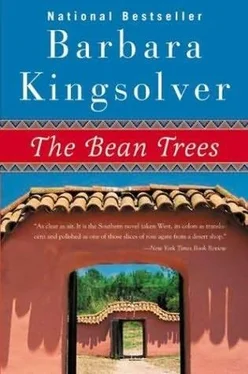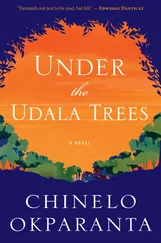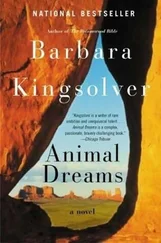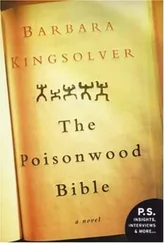Turtle was the only one of us who didn’t seem perturbed by the landscape. She told Esperanza a kind of ongoing story, which lasted for hundreds of miles and sounded like a vegetarian version of Aesop’s Fables, and when she ran out of story she played with her baby doll. The doll was a hand-me-down from Mattie’s. It came with a pair of red-checked pajamas, complete with regular-sized shirt buttons, that someone had apparently sewn by hand. Turtle adored the doll and had named it, with no help from anyone, Shirley Poppy.
We bypassed Oklahoma City and headed north on I-35, reversing the route I had taken through Oklahoma the first time. We reached the Broken Arrow Motor Lodge by late afternoon. At first I thought the place had changed hands. Which it had, in a way: Mrs. Hoge had died, and Irene was a different person, a slipcover of her former self. She had lost 106 pounds in 24 weeks by eating one Weight Watchers frozen dinner per day and nothing else but chamomile tea, unsweetened.
“I told Boyd if he wanted something different he could learn to cook it himself. Anybody that can butcher a side of beef can learn to cook,” she explained. She had started the diet on her doctor’s advice, when she decided she wanted to have a baby.
Irene seemed thrilled to see Turtle and me again and insisted on feeding the whole bunch of us. She made a pot roast with onions and potatoes even though she couldn’t touch it herself. She told us Mrs. Hoge had passed away in January, just a few weeks after I left.
“We knew it was coming, of course,” she said to Esperanza and Estevan. “She had the disease where you shake all the time.”
“That was a disease?” I asked. “I had no idea it was something you could die from. I thought it was just old age.”
“No,” Irene shook her head gravely. “Parkerson’s.”
“Who?” I asked.
“That’s the disease,” she said. “I notice she’s talking now.” She meant Turtle, who was busily naming every vegetable on Esperanza’s plate. She named them individually so it went like this: “Tato, carrot, carrot, carrot, carrot, tato, onion,” et cetera. Toward the end of the meal she also said “car,” because underneath all the food the plates had pictures of old-timey cars on them.
After the others went to bed I stayed up with Irene, who was expecting her husband in from Ponca City after midnight. We sat on high stools behind the desk in the bright front office, looking out through the plate glass at the highway and the long, flat plain behind it. She told me she missed Mrs. Hoge something fierce.
“Oh, I know she wasn’t kind ,” Irene said, her thinned-down bosom heaving with a long, sad sigh. “It was always ‘Here’s my daughter-in-law Irene that can’t make up a bed with hospital corners and is proud of it.’ But really I think she meant well.”
The next morning we had to make a decision. Either we would go straight to the sanctuary church, which was a little to the east of Oklahoma City, or we could all stay together for another day. They could come with me to the bar where I’d been presented with Turtle, to help me look for whatever I thought I was going to find in the way of Turtle’s relatives. I admitted to them that I could use the moral support, but on the other hand I would understand if they didn’t want to risk being on the road any more than they had to be. Without hesitation, they said they wanted to go with me.
Retracing my original route became a little more complicated. I had left the interstate when my steering column set itself free, that much I knew, and I’d stayed on a side road for several hours before joining back up with the main highway. I could remember hardly any exact details from that night, in the way of landmarks, and of course there were precious few there to begin with.
The clue that tipped me off was a sign to the Pioneer Woman Museum. I remembered that. We found a two-lane road that I was pretty sure was the right one.
As soon as we left the interstate, trading the fast out-of-state tourist cars for the companionship of station wagons and pickup trucks packed with families, we were on the Cherokee Nation. You could feel it. We began to understand that Oklahoma had been a good choice: Estevan and Esperanza could blend in here. Practically half the people we saw were Indians.
“Do Cherokees look like Mayans?” I asked Estevan.
“No,” he said.
“Would a white person know that?”
“No.”
After a little bit I asked him, “Would a Cherokee?”
“Maybe, maybe not.” He was smiling his perfect smile.
I asked Turtle if anything looked familiar. When I looked in the rear-view mirror I caught sight of her on Esperanza’s lap, playing with Esperanza’s hair and trying on Esperanza’s sunglasses. Later I saw them playing a clapping-hands game. The two of them looked perfectly content: “Madonna and Child with Pink Sunglasses.” Nobody, not even a Mayan, could say they weren’t. One time I thought-though I couldn’t swear it-I heard her call Turtle Ismene. I was getting a cold feeling in the bottom of my stomach.
I tried to keep myself cheerful. “I always tell Turtle she’s as good as the ones that came over on the Mayflower ,” I told Estevan. “They landed at Plymouth Rock. She just landed in a Plymouth.”
Estevan didn’t laugh. In all fairness, I might not have told him before that she was born in a car, but also he was preoccupied, going over and over the life history he had invented for himself and his Cherokee bride. He was quite imaginative. He had a whole little side plot about how his parents had disapproved of the marriage, but had softened their hearts when they saw what a lovely woman Hope was.
“Steven and Hope,” he said. “But we need a last name.”
“How about Two Two?” I said. “That’s a good solid Cherokee name. It’s been in my family for months.”
“Two Two,” he repeated solemnly.
I missed my own car. I missed Lou Ann, who always laughed at my jokes.
I was positive I wouldn’t recognize the place, if it was even still there, but as soon as I laid eyes on it I knew. A little brick building with a Budweiser sign, and across the parking lot a garage. The garage looked closed.
“That’s it,” I said. I slowed down. “What do I do?”
“Stop the car,” Estevan suggested, but I kept going. My heart was pounding like a piston. A quarter of a mile down the road I stopped.
“I’m sorry, but I can’t do this,” I said.
We all sat quietly for a minute.
“What is the worst thing that can happen?” Estevan asked.
“I don’t know. That I won’t find anybody that knows Turtle. Or that I will, and they’ll want her back.” I thought for a minute. “The worst thing would be that we lose her, some way,” I said finally.
“What if you don’t go in?”
“We lose her.”
Estevan gave me a hug. “For courage,” he said. Then Esperanza gave me a hug. Then Turtle did. I turned the car around and drove back to the bar.
“First let me go in alone,” I said.
It looked like a different place. I remembered all the signs-IN CASE OF FIRE YELL FIRE. They were gone. Blue gingham curtains hung in the windows and there were glasses of plastic roses and bachelor buttons on all the tables. I would have walked right out again, but I recognized the TV. Good picture, but no sound. And there was the same postcard rack too, although it seemed to have changed its focus, placing more emphasis on scenic lakes and less on Oral Roberts University.
A teenaged girl in jeans and an apron came through a door from the kitchen. She had a round Indian face behind large, blue-rimmed glasses.
“Get you some coffee?” she asked cheerfully.
“Okay,” I said, and sat down at the counter.
Читать дальше












